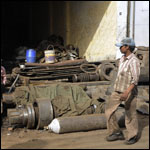Nuclear Suppliers Tighten Trade Rules, May Irk India Fredrik Dahl | Reuters
A 46-nation export control group has acted to bar states that shun a global anti-nuclear weapons pact from obtaining technology which can be used to make atomic bombs, diplomats and experts say.
|
|
Josh Funk | Associated Press
The utilities that run Nebraska's two nuclear power plants want the public to know the facilities are safe, even though floodwaters from the Missouri River have surrounded one plant and are encroaching on another. Fort Calhoun and Cooper nuclear power plants were both opened up to federal regulators and the media this week as part of a battle against persistent Internet rumors about their safety. Full Article
Leon V. Sigal | The National Interest
If engagement with North Korea has been difficult over the past two decades, disengagement has been disastrous. In the absence of negotiations, Pyongyang has taken steps to improve its nuclear and missile capabilities—or worse. The conventional wisdom in Washington is that Barack Obama held out his hand to Kim Jong-il only to have it slapped away. The reality is more complicated. Full Article
Susanne Koelbl | Der Spiegel
He built Pakistan's nuclear bomb and is accused of having sold his knowledge to Libya and Iran. Since 2004, Abdul Qadeer Khan has been under a state of house arrest. In an e-mail interview, he now explains why he accepted sole blame for the accusations at the time and points a finger at the Pakistani army. Full Article
Ariel Zirulnick | Christian Science Monitor
Iran fired 14 missiles and unveiled underground ballistic missile silos today, kicking off a series of war games over the next 10 days. Some of the missiles, launched today, have a range of more than 1,200 miles – enough to reach Israel and American installations in the region, Iranian PressTV reports. Longer-range missiles are not likely to be built because all of Iran's desired targets are already in reach with its current missiles, said Brig. Gen. Amir Ali Hajizadeh, commander of the Revolutionary Guards' aerospace division. Full Article
Jeff Donn | Associated Press
As America's nuclear power plants have aged, the once-rural areas around them have become far more crowded and much more difficult to evacuate. Yet government and industry have paid little heed, even as plants are running at higher power and posing more danger in the event of an accident, an Associated Press investigation has found. Populations around the facilities have swelled as much as 4 1/2 times since 1980, a computer-assisted population analysis shows. Full Article
|

